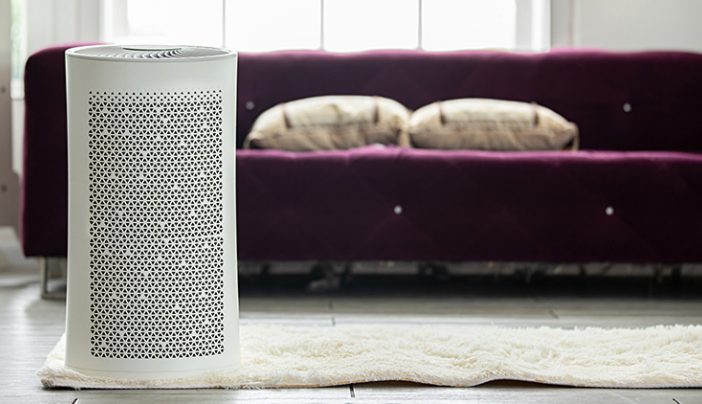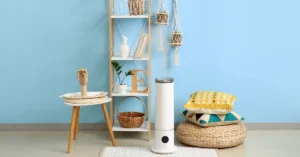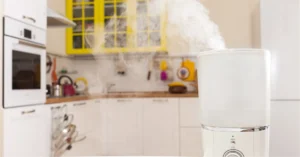An air purifier and a humidifier have distinct functions: an air purifier removes pollutants from the air, while a humidifier adds moisture to the air. Air purifiers improve air quality by removing particles like dust, pollen, and pet dander, helping reduce allergies and respiratory issues.
On the other hand, humidifiers increase humidity levels, relieving dry skin, congestion, and respiratory conditions caused by dry air.
While air purifiers benefit those with allergies or asthma, humidifiers are recommended for individuals dealing with dry air symptoms.
Understanding the differences between these devices can help determine the best solution for improving air quality and comfort in any indoor space.
Understanding Air Pollution And Indoor Air Quality
Understanding air pollution and indoor air quality is crucial for maintaining a healthy environment. When deciding between an air purifier and a humidifier, it’s important to consider their specific benefits.
An air purifier helps remove pollutants, while a humidifier adds moisture to the air, improving respiratory health.
Choose wisely to create a clean and comfortable indoor atmosphere.
Air pollution is a serious concern outdoors and within the confines of our homes. Understanding the impact of indoor air pollution and the significance of maintaining good indoor air quality is crucial for our overall health and well-being.
In this section, we will explore the effects of indoor air pollution on health, the factors contributing to it, and the importance of ensuring clean air in our living spaces.
The Impact Of Indoor Air Pollution On Health
- Breathing polluted air indoors can lead to various health issues, such as respiratory problems, allergies, asthma attacks, and lung cancer.
- Prolonged exposure to indoor air pollution can also result in cardiovascular diseases, neurological disorders, and developmental problems, especially in young children.
- Some common symptoms of indoor air pollution include coughing, sneezing, wheezing, headaches, dizziness, fatigue, and eye or skin irritation.
Factors Contributing To Indoor Air Pollution
- Poor ventilation: Insufficient airflow in homes can trap pollutants inside, leading to a buildup of harmful substances.
- Household products: Certain cleaning agents, pesticides, paints, and solvents release volatile organic compounds (VOCs) contributing to indoor air pollution.
- Building materials: Some building materials, such as carpets, furniture, and insulation, can release harmful chemicals into the air, especially when new or poorly maintained.
- Environmental factors: External pollutants, such as smoke, pollen, mold, and pet dander, can find their way indoors and worsen air quality.
- Cooking and heating: Combustion processes, like cooking with gas or using wood-burning stoves, can release pollutants such as nitrogen dioxide and carbon monoxide.
Significance Of Maintaining Good Indoor Air Quality
- Improved respiratory health: By reducing indoor air pollution, we can minimize the risk of respiratory diseases and provide a healthier environment for ourselves and our loved ones.
- Enhanced sleep quality: Clean air promotes better sleep, as it reduces the chances of breathing difficulties during the night.
- Increased productivity: Breathing clean air can positively impact our cognitive abilities and overall productivity levels, allowing us to focus better on tasks.
- Allergy and asthma management: Maintaining good indoor air quality helps alleviate symptoms for those suffering from allergies and asthma, allowing them to live more comfortably.
- Long-term well-being: Creating a healthy indoor environment by eliminating or reducing pollutants can improve our physical and mental well-being.
By understanding the impact of indoor air pollution on our health, pinpointing factors that contribute to it, and recognizing the significance of maintaining good indoor air quality, we can take proactive steps to improve the air we breathe.
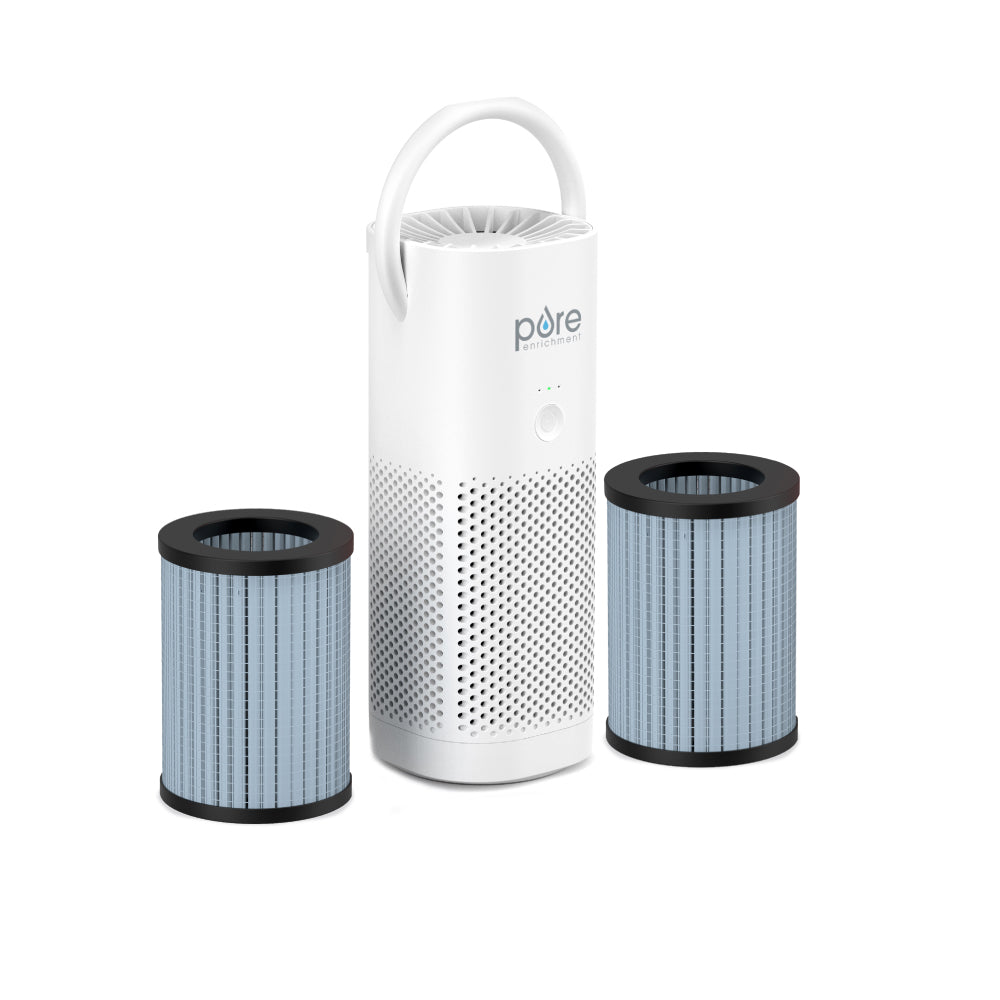
Air Purifiers: Filtering Out Pollutants For Cleaner Air
The article ‘Air Purifiers: Filtering Out Pollutants for Cleaner Air’ compares air purifiers and humidifiers, highlighting their differences in improving indoor air quality. Discover their benefits and find the right solution for your home.
Air purifiers are essential appliances for creating a healthy and clean indoor environment. They work by efficiently removing harmful pollutants and allergens from the air, promoting better air quality.
If you want to breathe in fresh air free from dust, pet dander, pollen, smoke, and other contaminants, an air purifier is exactly what you need.
This section will explore how air purifiers work, the different types available, their pros and cons, and how to choose the right one for your specific needs.
How Air Purifiers Work
Air purifiers use various methods to eliminate pollutants and enhance the air quality in your home or office. The following are some of the primary mechanisms employed by air purifiers:
- HEPA filters: High-efficiency particulate Air (HEPA) filters are known for their exceptional ability to capture tiny particles. These filters can remove up to 99.97% of microscopic allergens, such as dust mites, mould spores, and pollen, as small as 0.3 microns.
- Activated carbon filters: Activated carbon filters are highly effective at eliminating odours, gases, and chemical fumes from the air. This type of filter contains a large surface area with tiny pores that can trap and neutralize these foul-smelling substances.
- UV-C light filters: UV-C light filters utilize ultraviolet germicidal irradiation (UVGI) technology to kill harmful microorganisms like bacteria and viruses. By exposing the air to UV-C light, these filters prevent the growth and spread of disease-causing pathogens.
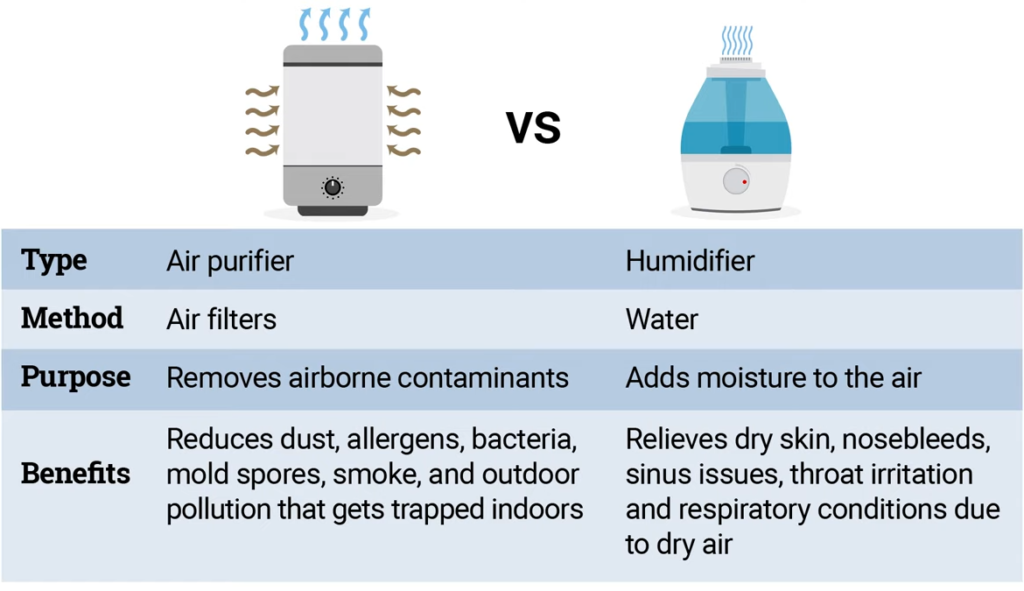
Pros And Cons Of Using Air Purifiers
Like any other appliance, air purifiers have their advantages and disadvantages. Understanding these can help you make an informed decision. Here are the pros and cons of using air purifiers:
Pros:
- Cleaner air: Air purifiers effectively reduce the concentration of pollutants in your indoor environment, which can lead to better overall air quality.
- Allergy relief: By removing allergens from the air, air purifiers can relieve allergy sufferers, reducing symptoms such as sneezing, coughing, and itching.
- Odour elimination: Activated carbon filters in air purifiers can help eliminate unpleasant odours caused by pets, cooking, or smoking.
Cons:
- Noise: Some air purifiers can generate noise, particularly at higher fan speeds. Consider this factor if you are sensitive to sounds while sleeping or working.
- Initial and ongoing costs: Air purifiers can be an investment, with upfront costs to purchase the unit and potential ongoing costs related to filter replacements.
- Limited effectiveness: While air purifiers effectively reduce specific types of pollutants, they may not eliminate all contaminants or provide a complete solution for air quality issues.
Choosing The Right Air Purifier For Your Needs
Selecting the appropriate air purifier requires consideration of your specific requirements. Here are a few factors to keep in mind while making your choice:
- Room size: Determine the square footage of the area where you intend to use the air purifier. Choose a model suitable for the room size to ensure maximum efficiency.
- Filter type: Consider the filter that best suits your needs, whether it’s a HEPA filter for allergen removal, an activated carbon filter for odor reduction, or a UV-C light filter for germ control.
- Noise levels: If noise concerns you, check the decibel rating of different air purifier models to find one that operates silently or with minimal noise.
- Maintenance and cost: Research the costs associated with filter replacements and how frequently they need to be changed. Opt for a model with easily accessible and affordable filters.
With these considerations in mind, you can make an informed decision and choose an air purifier that fits your specific requirements, ensuring that you and your loved ones enjoy cleaner and healthier air.
Humidifiers: Boosting Moisture Levels For Comfortable Living
Humidifiers and air purifiers serve different purposes. While air purifiers improve air quality by removing pollutants, humidifiers increase moisture levels for comfortable living. Choose the one that suits your needs for a healthier home environment.
Dry air can cause discomfort, such as dry skin, irritated eyes, and respiratory issues. To alleviate these problems, humidifiers are crucial in maintaining optimal humidity levels within your living space.
By adding moisture to the air, humidifiers offer numerous benefits to your overall well-being.
Let’s delve into the significance of humidifiers and explore the different types available in the market.
Role Of Humidifiers In Maintaining Optimal Humidity Levels
Humidifiers serve the essential purpose of increasing the moisture content in the air, creating a comfortable and healthy living environment. Here’s how they contribute:
- Ease respiratory discomfort: By adding moisture to the air, humidifiers can help alleviate sinus congestion and dry nasal passages and ease allergies or asthma symptoms.
- Relieve dry skin and lips: Dry air tends to cause skin irritation and chapped lips. Humidifiers restore moisture levels, promoting healthy skin and preventing dryness.
- Reduce flu and cold symptoms: Optimal humidity levels can help prevent the spread of airborne viruses that cause common colds and flu.
- Preserve wooden furniture and floors: Dry air can cause wood to shrink, leading to cracks and damage. By maintaining proper humidity, humidifiers protect your valuable furniture and preserve the integrity of wooden surfaces.
- Ensure comfortable sleep: Humidifiers help prevent snoring, alleviate dry throat, and reduce static electricity, ensuring a restful sleep.
Various Types Of Humidifiers:
Humidifiers come in different types, each operating uniquely to increase humidity levels. Here are the most commonly available types:
- Evaporative humidifiers: These humidifiers use a fan to blow air over a wet wick filter, producing moisture that is released into the room.
- Ultrasonic humidifiers: Ultrasonic vibrations break water particles into a microscopic mist, which is then diffused into the air by an internal fan. This type of humidifier operates silently.
- Steam vaporizers: Steam vaporizers heat water to produce steam, which is released into the air, increasing humidity levels. They are effective but require caution due to the risk of burns.
Benefits And Drawbacks Of Using Humidifiers:
Using a humidifier can have several advantages, but it’s important to consider potential drawbacks. Here’s a look at both sides:
Benefits:
- Alleviates respiratory issues and improves breathing.
- Relieves dry skin, eyes, and nasal passages.
- Reduces static electricity and damage to wooden furniture.
- Enhances sleep quality and overall comfort.
Drawbacks:
- Improper maintenance can lead to mould or bacterial growth.
- High humidity levels can promote the growth of dust mites and mould.
- Some humidifiers can be noisy or require frequent refilling.
- Over-humidification can cause condensation on windows and surfaces.
Selecting The Suitable Humidifier For Your Space:
Choosing the right humidifier is crucial to ensure optimal performance and comfort. Consider the following factors when making your selection:
- Room size: Determine the square footage of the room you wish to humidify to choose a humidifier with appropriate coverage.
- Type of humidifier: Evaluate the pros and cons of each type to select the one that suits your needs and preferences.
- Maintenance requirements: Consider ease of cleaning, filter replacement, and the need for special additives, such as demineralization cartridges.
- Noise level: Opt for ultrasonic humidifiers if you prefer a silent operation.
- Safety features: Consider automatic shut-off when water levels are low or adjustable humidity settings.
By selecting the most suitable humidifier for your space and understanding its benefits and limitations, you can ensure greater comfort and well-being in your living environment.
Comparing Air Purifiers And Humidifiers: Which One To Choose?
Choosing between an air purifier and a humidifier can be a daunting task. However, understanding their differences is crucial. While air purifiers filter out pollutants and allergens, humidifiers add moisture. Ultimately, the choice depends on your specific needs and the air quality in your environment.
Choosing between an air purifier and a humidifier can be puzzling when creating a healthier indoor environment. Both devices offer distinct benefits, but understanding their key differences is crucial in determining the right one for your needs.
In this post, we will compare air purifiers and humidifiers, explore when to use each, and even delve into combination options that offer the best of both worlds. So, let’s dive in and decide on a cleaner and more comfortable living space!
Key Differences Between Air Purifiers And Humidifiers:
To help you navigate through the sea of options, here are the key differences between air purifiers and humidifiers:
- Function: Air purifiers focus on removing pollutants, allergens, and odours from the air, while humidifiers add moisture to the air to combat dryness.
- Primary Purpose: Air purifiers are designed to improve air quality and remove harmful particles such as dust, pollen, pet dander, and volatile organic compounds (VOCs). On the other hand, humidifiers primarily aim to alleviate the symptoms of dry air, such as chapped lips, dry skin, and respiratory issues.
- Features: Air purifiers use various filtration technologies, such as HEPA filters, activated carbon filters, or UV light, to capture particles and neutralize odours. On the other hand, humidifiers utilize evaporation, ultrasonic technology, or steam to add moisture to the air.
- Maintenance: While both devices require regular maintenance, air purifiers typically involve filter replacements and occasional cleaning. In contrast, humidifiers necessitate diligent cleaning and disinfection to prevent the growth of bacteria and mould in the water tank.
When To Use An Air Purifier Or A Humidifier:
Determining when to use an air purifier or a humidifier depends on your specific needs and the indoor conditions you are facing. Here are some scenarios where each device shines:
**Air Purifiers**:
- If you suffer from allergies or respiratory conditions such as asthma, an air purifier can help remove airborne allergens, pollutants, and irritants that trigger symptoms.
- An air purifier can drastically improve indoor air quality if you live in an area with high pollution levels or near a busy road.
- If you have pets at home, an air purifier can eliminate pet dander and odours, ensuring a fresher living environment.
**Humidifiers**:
- If you experience dry skin, dry eyes, or frequent sinus congestion, a humidifier can add much-needed moisture to the air and alleviate these discomforts.
- If you reside in a region with low humidity, especially during winter, a humidifier can help maintain a comfortable humidity level, preventing issues like dry throat and static electricity.
- If you or a family member suffers from respiratory conditions like allergies or asthma, a humidifier can relieve respiratory irritation caused by dry air.
Combination Options: Air Purifier And Humidifier Hybrids:
For the ultimate indoor air quality control, you may consider hybrid devices that combine the functionalities of both air purifiers and humidifiers. These devices provide the benefits of clean air and proper humidity levels simultaneously, offering a comprehensive solution for your indoor environment.
However, it’s important to note that these combination options may require more complex maintenance routines and come at a higher cost.
Factors To Consider When Making A Decision:
When choosing between an air purifier and a humidifier, it’s essential to consider a few key factors:
- Indoor Air Quality: Assess the primary issue you want to address, poor air quality or dryness, to determine which device will serve you best.
- Specific Needs: Consider any allergies, respiratory conditions, or discomforts you or your family members experience, as this will guide you in selecting the most suitable device.
- Budget: Consider the device’s upfront cost, as well as any ongoing maintenance costs such as filter replacements or the need for distilled water with humidifiers.
- Space: Evaluate the size of the room or area you intend to use the device in, ensuring that the device’s capacity matches the space requirements for optimal performance.
By carefully weighing these factors, you can make an informed decision and choose the device that will positively impact your indoor environment.
When deciding between an air purifier and a humidifier, understanding the key differences, identifying your specific needs, and considering all the factors at play will help you make the right choice. Whether you prioritize cleaner air or alleviating dryness, there is a device out there that can improve your living space and contribute to a healthier lifestyle.
Maintenance And Best Practices For Air Purifiers And Humidifiers
Discover the essential maintenance and best practices for air purifiers and humidifiers, and gain insights on the key differences between these two devices. Improve your indoor air quality and create a healthier environment with these SEO-friendly tips.
Air purifiers and humidifiers are essential devices for maintaining a healthy indoor environment. To ensure their optimal performance and longevity, regular maintenance is crucial. By following the correct cleaning and maintenance guidelines, you can maximize their effectiveness and improve the air quality in your home.
Here are some essential maintenance tips for air purifiers and humidifiers:
Cleaning And Replacing Filters In Air Purifiers:
- Regularly clean or replace air purifier filters to ensure efficient operation.
- Remove and clean pre-filters every 30 days by vacuuming or rinsing with water.
- Depending on the manufacturer’s recommendations, HEPA filters should be replaced every 6 to 12 months.
- Activated carbon filters should be replaced at least every 3 months.
- Check the manufacturer’s instructions for specific cleaning and replacement guidelines.
- Avoid harsh cleaning agents on filters, which may damage or reduce their effectiveness.
Regular Maintenance Guidelines For Humidifiers:
- Empty and clean humidifier tanks daily or after every use to prevent mold and bacteria growth.
- Rinse the tank with mild soap and warm water, then thoroughly dry it before refilling.
- Clean the humidifier’s interior surfaces, such as the water reservoir and misting chamber, weekly or as the manufacturer recommends.
- Use white vinegar and water to remove mineral deposits and disinfect these parts.
- Rinse all components thoroughly to remove any residue before assembling the humidifier.
- If applicable, replace the water cartridge or filter according to the manufacturer’s instructions.
- Monitor and maintain the recommended humidity levels in your home to prevent excessive moisture and condensation.
Safety Precautions And Usage Recommendations:
- Place air purifiers and humidifiers on flat and stable surfaces, away from any obstacles or obstructions.
- Follow the manufacturer’s instructions for electrical safety and proper usage.
- Keep electrical cords, outlets, and power sources away from water to avoid potential hazards.
- Regularly check for any signs of damage, wear, or malfunctioning parts. If necessary, contact the manufacturer for repairs or replacements.
- Never operate air purifiers or humidifiers without proper ventilation to prevent the build-up of pollutants or excessive humidity.
Tips For Improving Indoor Air Quality Beyond Air Purifiers And Humidifiers:
- Keep your home clean to minimize dust, pet dander, and other allergens.
- Ensure proper ventilation by opening windows or using exhaust fans in bathrooms and kitchens.
- Avoid smoking or allowing smoking indoors.
- Use natural cleaners and avoid harsh chemicals that can emit harmful fumes.
- Regularly vacuum carpets and upholstery to remove dust and allergens.
- Place doormats at entrances to reduce the amount of dirt and pollutants brought indoors.
- Control humidity levels to prevent mould growth.
- Limit scented sprays, candles, or air fresheners that can release volatile organic compounds (VOCs).
By following these maintenance and best practices guidelines, you can ensure the efficient and safe operation of your air purifiers and humidifiers, contributing to a healthier and more comfortable indoor environment.
Frequently Asked Questions For Air Purifier Vs Humidifier
Which Is Better A Humidifier Or Air Purifier?
A humidifier adds moisture to the air, while an air purifier removes pollutants. Both can improve air quality, but it depends on your needs.
Do Air Purifiers Help With Stuffy Rooms?
Yes, air purifiers can help eliminate room stuffiness by removing airborne pollutants and improving air quality.
Do Air Purifiers Make The Air Dry?
Air purifiers do not dry the air; they remove pollutants and improve air quality.
What Are The Disadvantages Of Air Purifier?
Air purifiers have a few drawbacks, such as noise levels, ongoing filter replacement costs, and limited effectiveness against certain pollutants.
Conclusion
After considering the pros and cons of both air purifiers and humidifiers, it is clear that each serves a unique purpose. Air purifiers are essential for removing contaminants and improving air quality, making them a great choice for individuals with allergies or respiratory issues.
On the other hand, humidifiers add moisture to the air, preventing dryness and promoting better respiratory health. Depending on your specific needs, you may find that one or both of these devices can greatly enhance your indoor environment. To make the best decision, evaluate the air quality and humidity levels in your home and any specific health concerns.
Investing in a high-quality air purifier or humidifier can greatly impact your overall well-being. Consider your priorities, consult with experts if necessary, and choose the device that aligns most closely with your goals for a healthier and more comfortable living space.
